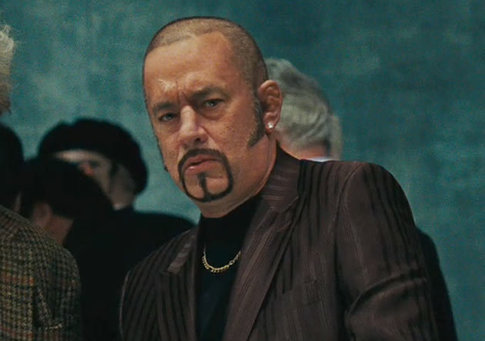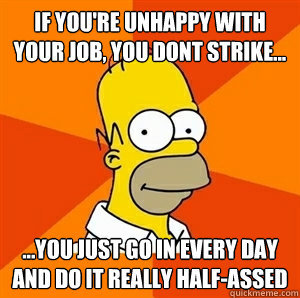Culture
Dear HEAVE: Advice on manners, social situations, and whether you can pull off aviator sunglasses.

Let’s face it, your mother was right: You have problems; you have so many, many problems. We have a website. By the Rules Of The Internet, we are qualified to fix your problems and offer advice.
Q: I have been seeing a successful, good-looking man for the last six months. The time we spend together is mostly great; we have the same tastes in movies, restaurants, and music, so we go out a lot. There’s one problem that I can’t get away from: He makes…interesting….style choices. He likes bold colors, unique hats and wild prints. For the most part, I can live with this, but next month we are supposed to attend a wedding together and he is very excited about the outfit he is planning — a pinstripe suit jacket with a sheer looking dark shirt underneath. It’s going to be awful. I’ve told him how I feel, but so far nothing has changed his mind. What can I do? – Emily, Chicago.
Let me start off by saying that I fully support your boyfriend’s decision to wear “unique hats.” For too long hats have blindly followed broad social trends, blending into the fabric of popular culture without questioning its cultural or intellectual merits. I refuse to wear a hat unless it is as angsty and repressed as Holden Caufield. From the rest of your description, it sounds as if you are either dating someone from the Persian mob, or the Tom Hanks character from the Cloud Atlas trailer:
I would stand to bet that you are correct, and your date will look like that guy at the wedding; the one who pulls unwilling girls onto to the dance floor. But you say that “it will be awful,” and that you’ve expressed your fear to him. Maybe you need to think less about the message, and more about the method you are using. Telling someone you have been dating for half a year that their clothing is going to look “awful” is really only going to encourage him to dig in his heels. When we are attacked, we become more entrenched in our positions, not less, a phenomenom you can see in many marriages and in the clusterfuck we currently call a Presidential election. Rather then tell your boyfriend how terrible he is going to look, try suggesting a change in more proactive ways. The next time you are out shopping, point out some clothing you like and say, “You’d look great in that suit because you’re so athletic.” If you contextualize your advice within a compliment — focusing on the positive things about the man that you wish to highlight — he might be more receptive to what you have to say.
You do say, though, that you can deal with his style for the most part. So maybe you are not looking to change his entire wardrobe, but just his outfit for this particular occasion. In that case, try telling your significant other that this wedding is going to be a more subdued affair, and that a flashy suit might distract from the bride and groom. Ask him if he can go with a quiet outfit for one weekend, and then get back to the wild prints the following week.
Q: Ryan, I need help dealing with my boss. She is a big bully and plays favorites. Last week, I called out sick and was told I needed to bring in a doctor’s note or I would get docked pay or even fired. The same day, another co-worker just didn’t show up for work and didn’t get in trouble. Can I call out the boss for favoritism, or should I just quit? -Natalie, Chicago.
Hey, we’ve all had some bad days at work:
The first thing you need to do is slow yourself down. Let’s assume that quitting is off the table, because this isn’t the type of job market that rewards brashly quitting one job (and probably sabotaging any chance of getting a strong recommendation from it in the process). If you work in a large office, I think your first meeting should be with an HR representative. Explicitly treating one employee differently than another may be a violation of company policy.
At the very least, this will allow you to get your complaint recorded and start an official file on the subject, in case your boss ever does move to fire you over something trivial. In an office with an especially competent HR team, someone might even be able to raise your concerns to the boss anonymously, though that leaves the risk of your boss intuiting that it was you. You may be right about your boss’ favoritism, but if she is as petty as you say, then her response to being “called out” isn’t going to be thoughtful or measured. Some bosses are terrible: overbearing people with over-inflated egos. But she is your boss, regardless, and unless she crosses a line that involves a violation of company policy, the smartest move is to keep working so that you can move on and move up.
Q: My girlfriend doesn’t tip. Ever. It drives me crazy, and I feel embarrassed when we go out to eat. Am I making too much of it? -William, Indianapolis
Is she European? Because Europeans are allowed to get away with a) not tipping, and b) growing creepy, pencil-thin mustaches.
In all seriousness, you’re not making too much of this; if anything, you’re making too little. I don’t mean to over-dramatize the issue, but tipping is a core function of the respect someone shows to people in the service industry. A few months ago Kate Connor wrote a blog post that gained some popularity called “Ten Things I Want to Tell Teenage Girls.” Connor’s advice was smart and honest, but her husband’s companion post, full of advice for teenage boys, is even better. I love the first paragraph:
Shortcuts to popularity? Maybe. Shortcuts to hype/cred/fame/swag? Sure, whatever. But shortcuts to respect? None. You earn it or you don’t. You earn it by giving it to people that deserve it. You earn it by giving it to people that don’t. Men, women, kids, the elderly. Teachers, parents, the greeter at Walmart. You earn it by the way you carry yourself. The sooner you realize it’s what you really want, the quicker you can quit looking for shortcuts that don’t exist.
He’s absolutely right, and to that let’s add a truth for girls and boys, young and old: The way you treat those beneath you tells me volumes about the kind of person you are. Do you yell at or demean waiters or cashiers? Do you acknowledge doormen, store greeters or grocery baggers? Do you thank people or employees who go out of their way to help you or do their job well? We make the mistake — again and again — that kindness is meaningless because it is easy. But nearly the exact opposite is true: It’s the accumulation of everyday kindnesses — small gestures of generosity, thanks or politeness — that matter most. Tipping isn’t just an annoying little task at the end of a meal, it’s a recognition of a job well done by the server, and an acknowledgement of the shitty wages that people in the service industry bring home. Your girlfriend is probably a lovely person, but refusing to tip — barring poor service — is rude and unattractive.
That’s it for this week! If you have a question, send it to askheave@gmail.com, or message us on Facebook.

